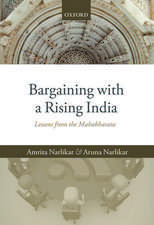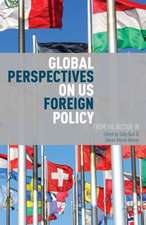Concepts in World Politics
Editat de Felix Berenskoetteren Limba Engleză Paperback – 22 aug 2016
With contributions from some of the foremost authorities in the field, Concepts in World Politics explores 17 core concepts, from democracy to globalization, sovereignty to revolution, and covers:
- The multiple meanings of a concept, where these meanings come from, and how they are employed theoretically and practically
- The consequences of using concepts to frame the world in one way or another
- The method of concept analysis
| Toate formatele și edițiile | Preț | Express |
|---|---|---|
| Paperback (1) | 414.49 lei 6-8 săpt. | |
| SAGE Publications – 22 aug 2016 | 414.49 lei 6-8 săpt. | |
| Hardback (1) | 985.72 lei 3-5 săpt. | |
| SAGE Publications – 22 aug 2016 | 985.72 lei 3-5 săpt. |
Preț: 414.49 lei
Nou
Puncte Express: 622
Preț estimativ în valută:
79.33€ • 82.60$ • 67.04£
79.33€ • 82.60$ • 67.04£
Carte tipărită la comandă
Livrare economică 10-24 martie
Preluare comenzi: 021 569.72.76
Specificații
ISBN-13: 9781446294284
ISBN-10: 1446294285
Pagini: 344
Dimensiuni: 170 x 242 x 22 mm
Greutate: 0.57 kg
Ediția:First Edition
Editura: SAGE Publications
Colecția Sage Publications Ltd
Locul publicării:London, United Kingdom
ISBN-10: 1446294285
Pagini: 344
Dimensiuni: 170 x 242 x 22 mm
Greutate: 0.57 kg
Ediția:First Edition
Editura: SAGE Publications
Colecția Sage Publications Ltd
Locul publicării:London, United Kingdom
Recenzii
In the beginning was the word, the word took on many meanings and became a concept. The concept went on to create the social world. Follow it all here.
This fascinating and insightful edited volume has an incredibly useful yet simple premise: unpack seminal concepts in the study of world politics in order to understand their history, meaning and usage. Frequently evoked yet poorly understood, concepts such sovereignty, power, democracy, globalization and many others are carefully unpacked by some of the best theorists in the field today. This volume is an invaluable resource for anyone who has puzzled over the meaning of foundational international relations concepts, asked why these ideas are so important, and questioned what role these concepts play in both the study and practice of world affairs.
It should come as news to no one that basic concepts in international studies such as 'intervention' or 'sovereignty' are contested bundles of meaning that change over time. This volume goes well beyond that observation, using it as a starting-point for a set of richly detailed investigations into the plurality of meanings composing those concepts both inside and outside of the world of academic scholarship. Such a mapping of the basic 'mental furniture' of international affairs provides an excellent point of departure for discussions about the ongoing production and reproduction of the world we inhabit. Excellent for students of international affairs at all levels, including those advanced students who sometimes style themselves 'professionals'.
This fascinating and insightful edited volume has an incredibly useful yet simple premise: unpack seminal concepts in the study of world politics in order to understand their history, meaning and usage. Frequently evoked yet poorly understood, concepts such sovereignty, power, democracy, globalization and many others are carefully unpacked by some of the best theorists in the field today. This volume is an invaluable resource for anyone who has puzzled over the meaning of foundational international relations concepts, asked why these ideas are so important, and questioned what role these concepts play in both the study and practice of world affairs.
It should come as news to no one that basic concepts in international studies such as 'intervention' or 'sovereignty' are contested bundles of meaning that change over time. This volume goes well beyond that observation, using it as a starting-point for a set of richly detailed investigations into the plurality of meanings composing those concepts both inside and outside of the world of academic scholarship. Such a mapping of the basic 'mental furniture' of international affairs provides an excellent point of departure for discussions about the ongoing production and reproduction of the world we inhabit. Excellent for students of international affairs at all levels, including those advanced students who sometimes style themselves 'professionals'.
Cuprins
Chapter 1: Unpacking Concepts - Felix Berenskoetter
PART 1: CLAIMS
Chapter 2: Power - Stefano Guzzini
Chapter 3: Security - Holger Stritzel/Juha Vuori
Chapter 4: Rationality - Annette Freyberg-Inan
Chapter 5: Identity - Richard Ned Lebow
PART 2: CONDITIONS
Chapter 6: War - Antoine Bousquet
Chapter 7: Peace - Oliver Richmond/Felix Berenskoetter
Chapter 8: Anarchy - Alex Prichard
Chapter 9: Society - Oliver Kessler/Benjamin Herborth
Chapter 10: Capitalism - Benno Teschke/Frido Wenten
PART 3: SYSTEMS OF GOVERNANCE
Chapter 11: Sovereignty - Tanja Aalberts
Chapter 12: Hegemony - Alejandro Colas
Chapter 13: Democracy - Piki Ish-Shalom
Chapter 14: Religion - Maria Birnbaum
PART 4: MODES OF TRANSFORMATION
Chapter 15: Revolution - Rahul Rao
Chapter 16: Intervention - David Chandler
Chapter 17: Integration - Thomas Diez
Chapter 18: Globalization - Stephan Stetter
PART 1: CLAIMS
Chapter 2: Power - Stefano Guzzini
Chapter 3: Security - Holger Stritzel/Juha Vuori
Chapter 4: Rationality - Annette Freyberg-Inan
Chapter 5: Identity - Richard Ned Lebow
PART 2: CONDITIONS
Chapter 6: War - Antoine Bousquet
Chapter 7: Peace - Oliver Richmond/Felix Berenskoetter
Chapter 8: Anarchy - Alex Prichard
Chapter 9: Society - Oliver Kessler/Benjamin Herborth
Chapter 10: Capitalism - Benno Teschke/Frido Wenten
PART 3: SYSTEMS OF GOVERNANCE
Chapter 11: Sovereignty - Tanja Aalberts
Chapter 12: Hegemony - Alejandro Colas
Chapter 13: Democracy - Piki Ish-Shalom
Chapter 14: Religion - Maria Birnbaum
PART 4: MODES OF TRANSFORMATION
Chapter 15: Revolution - Rahul Rao
Chapter 16: Intervention - David Chandler
Chapter 17: Integration - Thomas Diez
Chapter 18: Globalization - Stephan Stetter
Descriere
An exciting, challenging new way to approach the study of world politics, this book focusses on the multifaceted nature of concepts and systematically explains them in a clear, critical and engaging way












